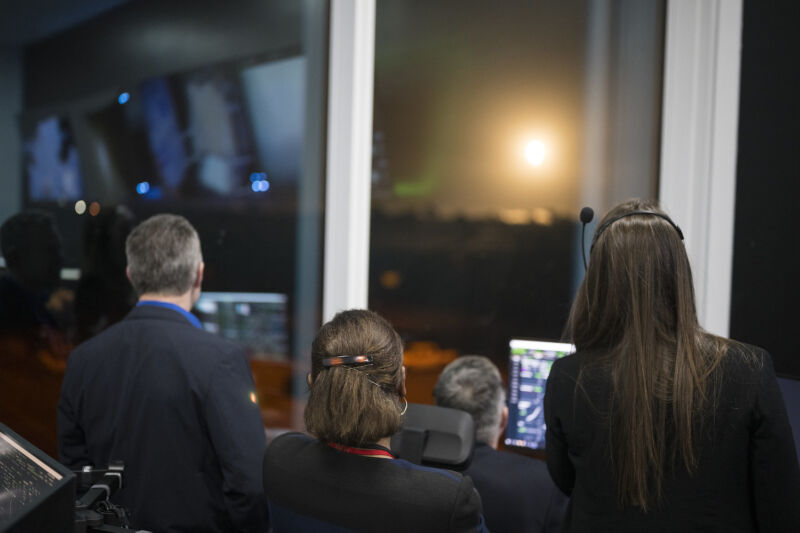“SpaceX will be filing suit against the FAA for regulatory overreach,” Musk said.

The Federal Aviation Administration alleged Tuesday that SpaceX violated its launch license requirements on two occasions last year by using an unauthorized launch control center and fuel farm at NASA’s Kennedy Space Center in Florida.
The regulator seeks to fine SpaceX $633,009 for the alleged violations, which occurred during a Falcon 9 launch and a Falcon Heavy launch last year. Combined, the proposed fines make up the largest civil penalty ever imposed by the FAA’s commercial spaceflight division.
“Safety drives everything we do at the FAA, including a legal responsibility for the safety oversight of companies with commercial space transportation licenses,” said Marc Nichols, the FAA’s chief counsel, in a statement. “Failure of a company to comply with the safety requirements will result in consequences.”
Hours later, Elon Musk, SpaceX’s founder and CEO, vowed to sue the FAA, calling the proposed penalties an example of “lawfare” against his company. “SpaceX will be filing suit against the FAA for regulatory overreach,” Musk posted on X, his social media platform.
The FAA rarely imposes fines on commercial space companies. The agency oversees the licensing of commercial launch and reentry operations by US companies and is responsible for ensuring spaceflight activities do not endanger the uninvolved public or go against US national security and foreign policy interests.
Last week, SpaceX accused the FAA of delaying the next test flight of the company’s giant Starship rocket “for unreasonable and exasperating reasons.” The FAA said it doesn’t expect to decide on approving SpaceX’s request for a commercial launch license for the next Starship launch until late November, two months later than the FAA’s previous estimate.
For the first time, SpaceX will attempt to return the Starship rocket’s Super Heavy booster back to its launch pad in South Texas on the next flight. The FAA said this change in mission profile triggered a more in-depth regulatory review.
Musk, who supports former President Donald Trump in this year’s presidential election, has denounced labor, health, and now spaceflight regulations, and Trump has said he will enlist Musk to head a “government efficiency commission” if elected president.
Ars Video
How The Callisto Protocol’s Team Designed Its Terrifying, Immersive Audio
The FAA’s commercial space division has struggled to keep pace with SpaceX’s rapid-fire launch cadence. SpaceX and other space industry advocates have called for Congress to appropriate more money for the FAA space office. Lawmakers approved an increase in funding for the FAA’s Office of Commercial Space Transportation to $42 million for fiscal year 2024.
This allowed the FAA’s space office to hire approximately 35 new workers, bringing the total staffing level to 158 employees, said Kelvin Coleman, the FAA’s associate administrator for space transportation, in a hearing last week before the House Space and Aeronautics subcommittee. The Biden administration requested another funding increase for the FAA space office in fiscal year 2025.
What did they do?
According to the FAA, SpaceX violated its launch license requirements twice during a Falcon 9 launch of an Indonesian communications satellite on June 18, 2023. SpaceX’s launch team used a new control room at the company’s Hangar X facility at Kennedy Space Center instead of the FAA-approved control rooms SpaceX previously used at the Florida spaceport. In addition, SpaceX’s launch team did not conduct a readiness poll two hours before liftoff.
More than a month before this launch, SpaceX requested FAA approval to use the new launch control room and remove the readiness poll from its countdown procedures. The FAA says it informed SpaceX it would not approve the changes in time for the June 18 launch last year, but SpaceX went ahead with the mission.
The new control center at Hangar X debuted last year, and NASA approved its use for the launch of an astronaut crew to the International Space Station in August 2023.
On a separate launch of a Falcon Heavy rocket a month later, the FAA alleges SpaceX used an “unapproved rocket propellant farm” located at Launch Complex 39A at Kennedy. Nine days before the Falcon Heavy mission, SpaceX asked the FAA for an update to its launch license nine days prior to reflect the change to the ground fuel facility at the launch pad. Similar to the situation a month before, the FAA says it told SpaceX it would not grant the company’s request in time for the launch.
The FAA said SpaceX has 30 days to respond to the allegations.
The last time the FAA imposed a fine on a commercial space company was last year when regulators fined SpaceX $175,000 for not submitting launch collision avoidance analysis trajectory data to the FAA for a Falcon 9 launch in 2022. SpaceX paid the fine in October 2023.




